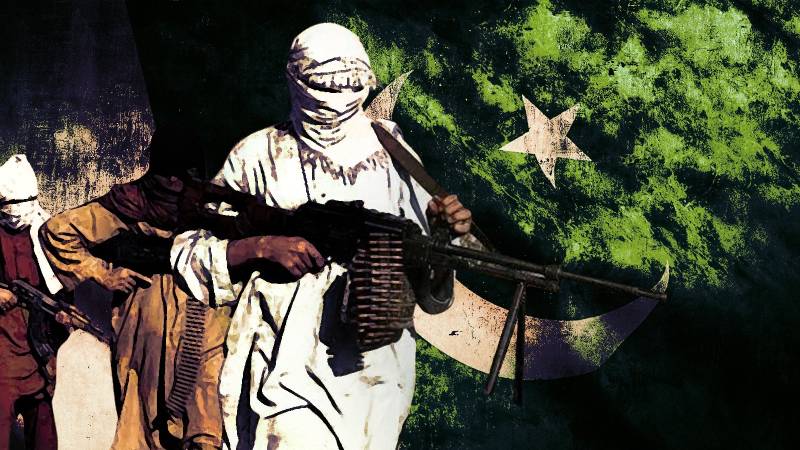
The sudden takeover of Kabul by the Afghan Taliban left the global community in disbelief, as they witnessed how the Afghan Army swiftly capitulated by handing power to the Taliban almost effortlessly.
In stark contrast, a substantial majority of Pakistan's population not only embraced the return of the Afghan Taliban but also celebrated their resurgence.
Some government officials even framed this development as a victory for Pakistan and a defeat for India and America.
Former Prime Minister Imran Khan conveyed his congratulations to the newly established regime, characterising it as a liberation from what he referred to as the "shackles of slavery" by toppling the Western-backed Afghan government.
Amid this backdrop, another entity emboldened by the Taliban's resurgence was the Tehrik-i-Taliban Pakistan (TTP). Shortly after the Taliban's takeover of Kabul, the TTP officially celebrated this turn of events, viewing it as a significant triumph for the broader jihadi agenda. Mufti Noor Wali Mehsud, the leader of TTP, publicly renewed his group's allegiance to the Taliban's leadership, specifically to Emir Hibatullah Akhundzada, and pledged unwavering support for the Afghan Taliban's cause. In reciprocation, the Afghan Taliban released all TTP prisoners detained in Afghan prisons.
While Pakistan continues to voice support for the Afghan Taliban and urges the international community to engage with them, some sections in Taliban government have adopted a nationalistic stance that challenges Pakistan's interests.
This is prominently evident in their skepticism regarding the legitimacy of the Durand Line fencing, which divides ethnic Pashtuns on both sides of the border.
Additionally, they have provided refuge to the TTP, a group known for its active involvement in extremist violence within Pakistan."
A report from the Pakistan Institute for Peace Studies in 2022 underscored the consequences of the Taliban's return to power. It revealed a concerning trend of increased terrorist attacks in Pakistan in the year following the Taliban's takeover.
Over a span of 21 months following the Taliban's resurgence (from August 2021 to April 2023), the number of terrorist attacks in Pakistan skyrocketed by 73%, leading to a 138% increase in casualties.
Additionally, a report from the UN Security Council highlighted that the TTP constitutes the largest component of foreign terrorist fighters in Afghanistan, numbering between 3,000 to 4,000 individuals.
It was noted that the current TTP leader, Mufti Noor Wali Mehsud, has managed to consolidate the group, making it more cohesive and thus posing a greater regional threat.
The origin of the TTP can be traced to the intricate dynamics among various jihadist groups following the U.S. invasion of Afghanistan in 2001.
Initially, some Pakistani militants who had previously supported Pakistan's interests in Afghanistan and Kashmir turned against their own nation due to its alignment with the U.S. in the global "war on terror."
These militants began providing refuge to the Afghan Taliban, al-Qaeda and other militants escaping the conflict in Afghanistan.
Over time, Pakistan's efforts to curb these safe havens led to these Pakistani militants aligning more formally with al-Qaeda and the Afghan Taliban, culminating in the formation of the TTP in 2007.
Initially, the TTP positioned itself as an extension of the Afghan Taliban, professing allegiance to Mullah Mohammed Omar, the then-leader of the Afghan Taliban, as its spiritual guide. It expressed a readiness to assist the Afghan Taliban in their struggle against the United States and its allies.
Although the TTP framed its militant activities as defensive measures in response to Pakistan's military operations, its ultimate objective was to emulate the path of the Afghan Taliban and institute a sharia-based system in Pakistan, seeking to liberate the nation from what it perceived as "American puppets" governing the country.
As time progressed, however, the TTP's focus and strategies underwent significant shifts.
Despite Pakistan's optimism that the Afghan Taliban would assist in controlling the TTP, the Taliban have shown limited inclination to take decisive action against their ideological counterparts in Pakistan. Several factors contribute to the sympathy or alignment between certain factions within the Taliban and the TTP.
Firstly, both the Afghan and Pakistani Taliban movements are predominantly Pashtun, sharing common roots in Pashtun nationalism alongside their Islamist extremist ideologies. This shared ethnicity establishes a solid fraternal connection between the two groups.
Moreover, they share a common objective of dismantling the fencing along the Durand Line, which divides ethnic Pashtuns across the border. Reports indicate that the Taliban have taken steps to remove portions of this fencing along the Durand Line.
Secondly, given Pakistan’s long history of manipulating Afghan political and ethnic fault-lines, the Taliban are now paying them back in the same coin by using TTP as bargaining leverage and putting Pakistan on the defensive. Afghan Taliban now have the upper hand in forcing negotiations on TTP’s terms.
An additional angle is that if the Taliban choose to deal with TTP aggressively, it’s likely that they would establish a coalition with Taliban’s jihadist rival, ISI-K (Islamic State in Khorasan Province) which poses a serious challenge to the Taliban's authority and control in Afghanistan.
In this ever-evolving geopolitical chessboard, the nexus between the Afghan Taliban, Pakistan, and the Tehrek-e-Taliban Pakistan remains a critical factor to watch. The delicate dance of power, influence, and ideology is far from over, and the stakes are high not just for the region but for global security as well.
As Afghanistan reshapes its destiny and Pakistan navigates a complex relationship, the world waits to see how these dynamics will ultimately unfold.
One thing is certain: the interplay between these actors will continue to shape the contours of South Asian politics and security for years to come, with consequences reverberating far beyond the region's borders.

